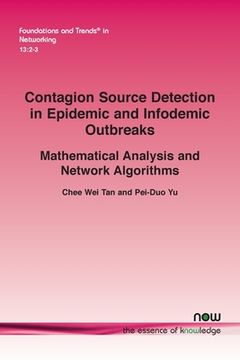Share
Contagion Source Detection in Epidemic and Infodemic Outbreaks: Mathematical Analysis and Network Algorithms
Chee Wei Tan
(Author)
·
Pei-Duo Yu
(Author)
·
Now Publishers
· Paperback
Contagion Source Detection in Epidemic and Infodemic Outbreaks: Mathematical Analysis and Network Algorithms - Tan, Chee Wei ; Yu, Pei-Duo
Choose the list to add your product or create one New List
✓ Product added successfully to the Wishlist.
Go to My Wishlists
Origin: U.S.A.
(Import costs included in the price)
It will be shipped from our warehouse between
Tuesday, June 18 and
Thursday, July 04.
You will receive it anywhere in United Kingdom between 1 and 3 business days after shipment.
Synopsis "Contagion Source Detection in Epidemic and Infodemic Outbreaks: Mathematical Analysis and Network Algorithms"
The rapid spread of infectious diseases and online rumors share similarities in terms of their speed, scale, and patterns of contagion. Although these two phenomena have historically been studied separately, the COVID-19 pandemic has highlighted the devastating consequences that simultaneous crises of epidemics and misinformation can have on the world. Soon after the outbreak of COVID-19, the World Health Organization launched a campaign against the COVID-19 Infodemic, which refers to the dissemination of pandemic-related false information online that causes widespread panic and hinders recovery efforts. Undoubtedly, nothing spreads faster than fear. Networks serve as a crucial platform for viral spreading, as the actions of highly influential users can quickly render others susceptible to the same. The potential for contagion in epidemics and rumors hinges on the initial source, underscoring the need for rapid and efficient digital contact tracing algorithms to identify super-spreaders or Patient Zero. Similarly, detecting and removing rumor mongers is essential for preventing the proliferation of harmful information in online social networks. Identifying the source of large-scale contagions requires solving complex optimization problems on expansive graphs. Accurate source identification and understanding the dynamic spreading process requires a comprehensive understanding of surveillance in massive networks, including topological structures and spreading veracity. Ultimately, the efficacy of algorithms for digital contact tracing and rumor source detection relies on this understanding. This monograph provides an overview of the mathematical theories and computational algorithm design for contagion source detection in large networks. By leveraging network centrality as a tool for statistical inference, we can accurately identify the source of contagions, trace their spread, and predict future trajectories. This approach provides fundamental insights into surveillance capability and asymptotic behavior of contagion spreading in networks. Mathematical theory and computational algorithms are vital to understanding contagion dynamics, improving surveillance capabilities, and developing effective strategies to prevent the spread of infectious diseases and misinformation.
- 0% (0)
- 0% (0)
- 0% (0)
- 0% (0)
- 0% (0)
All books in our catalog are Original.
The book is written in English.
The binding of this edition is Paperback.
✓ Producto agregado correctamente al carro, Ir a Pagar.

